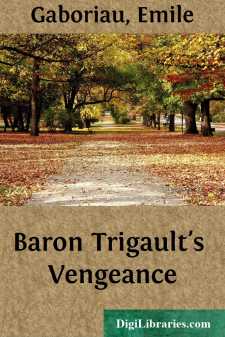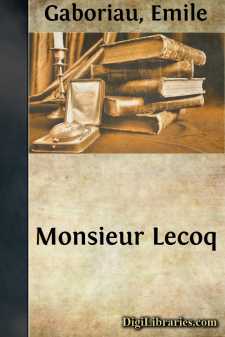Categories
- Antiques & Collectibles 13
- Architecture 36
- Art 48
- Bibles 22
- Biography & Autobiography 813
- Body, Mind & Spirit 142
- Business & Economics 28
- Children's Books 17
- Children's Fiction 14
- Computers 4
- Cooking 94
- Crafts & Hobbies 4
- Drama 346
- Education 46
- Family & Relationships 57
- Fiction 11829
- Games 19
- Gardening 17
- Health & Fitness 34
- History 1377
- House & Home 1
- Humor 147
- Juvenile Fiction 1873
- Juvenile Nonfiction 202
- Language Arts & Disciplines 88
- Law 16
- Literary Collections 686
- Literary Criticism 179
- Mathematics 13
- Medical 41
- Music 40
- Nature 179
- Non-Classifiable 1768
- Performing Arts 7
- Periodicals 1453
- Philosophy 64
- Photography 2
- Poetry 896
- Political Science 203
- Psychology 42
- Reference 154
- Religion 513
- Science 126
- Self-Help 84
- Social Science 81
- Sports & Recreation 34
- Study Aids 3
- Technology & Engineering 59
- Transportation 23
- Travel 463
- True Crime 29
Emile Gaboriau
Émile Gaboriau (1832-1873) was a French writer renowned for pioneering the detective fiction genre. His notable works include "L'Affaire Lerouge" (1866) and "Monsieur Lecoq" (1868), which introduced the character of Monsieur Lecoq, a methodical and astute detective who inspired later literary detectives like Sherlock Holmes. Gaboriau's intricate plotting and detailed investigation techniques laid the groundwork for modern detective stories.
Author's Books:
Sort by:
by:
Emile Gaboriau
FIRST PART—FIRE AT VALPINSON These were the facts:—I.In the night from the 22nd to the 23rd of June, 1871, towards one o'clock in the morning, the Paris suburb of Sauveterre, the principal and most densely populated suburb of that pretty town, was startled by the furious gallop of a horse on its ill-paved streets. A number of peaceful citizens rushed to the windows. The dark night allowed...
more...
by:
Emile Gaboriau
CHAPTER I. PUTTING ON THE SCREW. The cold on the 8th of February, 186-, was more intense than the Parisians had experienced during the whole of the severe winter which had preceded it, for at twelve o'clock on that day Chevalier's thermometer, so well known by the denizens of Paris, registered three degrees below zero. The sky was overcast and full of threatening signs of snow, while the...
more...
by:
Emile Gaboriau
I There is not, perhaps, in all Paris, a quieter street than the Rue St. Gilles in the Marais, within a step of the Place Royale. No carriages there; never a crowd. Hardly is the silence broken by the regulation drums of the Minims Barracks near by, by the chimes of the Church of St. Louis, or by the joyous clamors of the pupils of the Massin School during the hours of recreation. At night, long...
more...
by:
Emile Gaboriau
I On Thursday, the 9th of July, 186-, Jean Bertaud and his son, well known at Orcival as living by poaching and marauding, rose at three o'clock in the morning, just at daybreak, to go fishing. Taking their tackle, they descended the charming pathway, shaded by acacias, which you see from the station at Evry, and which leads from the burg of Orcival to the Seine. They made their way to their boat,...
more...
by:
Emile Gaboriau
It was a Thursday evening, the fifteenth of October; and although only half-past six o'clock, it had been dark for some time already. The weather was cold, and the sky was as black as ink, while the wind blew tempestuously, and the rain fell in torrents. The servants at the Hotel de Chalusse, one of the most magnificent mansions in the Rue de Courcelles in Paris, were assembled in the...
more...
by:
Emile Gaboriau
I Vengeance! that is the first, the only thought, when a man finds himself victimized, when his honor and fortune, his present and future, are wrecked by a vile conspiracy! The torment he endures under such circumstances can only be alleviated by the prospect of inflicting them a hundredfold upon his persecutors. And nothing seems impossible at the first moment, when hatred surges in the brain, and the...
more...
by:
Emile Gaboriau
I. There is not in all Paris a house better kept or more inviting-looking than No. 23 in Grange Street. As soon as you enter, you are struck by a minute, extreme neatness, which reminds you of Holland, and almost sets you a-laughing. The neighbors might use the brass plate on the door as a mirror to shave in; the stone floor is polished till it shines; and the woodwork of the staircase is varnished to...
more...
by:
Emile Gaboriau
I At about eleven o'clock in the evening of the 20th of February, 186—, which chanced to be Shrove Sunday, a party of detectives left the police station near the old Barriere d'Italie to the direct south of Paris. Their mission was to explore the district extending on the one hand between the highroad to Fontainebleau and the Seine, and on the other between the outer boulevards and the...
more...
by:
Emile Gaboriau
CHAPTER I. On Thursday, the 6th of March, 1862, two days after Shrove Tuesday, five women belonging to the village of La Jonchere presented themselves at the police station at Bougival. They stated that for two days past no one had seen the Widow Lerouge, one of their neighbours, who lived by herself in an isolated cottage. They had several times knocked at the door, but all in vain. The...
more...
by:
Emile Gaboriau
CHAPTER I On the first Sunday in the month of August, 1815, at ten o'clock precisely—as on every Sunday morning—the sacristan of the parish church at Sairmeuse sounded the three strokes of the bell which warn the faithful that the priest is ascending the steps of the altar to celebrate high mass. The church was already more than half full, and from every side little groups of peasants were...
more...











